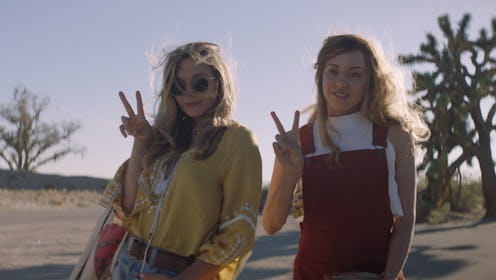
Generally speaking, I'm pretty averse to movies about social media. But apparently, when those movies come through Sundance (sup, Catfish?), I'm willing to pay attention. Enter 2017's Ingrid Goes West, the Instagram-themed Sundance movie that I literally cannot stop thinking about. Director & writer Matt Spicer, producer & star Aubrey Plaza, and co-stars Elizabeth Olsen & O'Shea Jackson all sat down with reporters during the mercilessly snowy Sundance Film Festival to break down the shocking, yet hilarious film's take on everyone's favorite photo app.
"I'm obsessed with Instagram," Spicer told the audience during the Q&A at the film's Sundance premiere. I wondered then, why he would choose to tell such a harrowing tale of Ingrid (Plaza), dangerously obsessing over her dream bestie, Taylor (Elizabeth Olsen), so much so that she moves to Los Angeles and assumes an identity designed to become her closest friend? As it turns out, creating this story might have changed that love of Instagram a wee bit.
"I used to post a lot more than I do now. I post here and there still, but it definitely made me think more like, 'Why am I posting this? What am I trying to get out of this?' And if the answer wasn’t something that I liked then I wouldn’t do it," he says of his social media perspective post-Ingrid. "I always admire people who are able to be real on social media and I find that to be — it’s weird that it’s a challenge to be that way, because you would think it would be super easy, but it’s actually hard because I think we’re sort of programmed to project this version of ourselves, this other identity that we’ve created for ourselves."
Gee, I wonder why his main character totally transforming herself into a Los Angeles it-girl of Instagram in order to befriend the Los Angeles it-girl of Instagram, only to find herself in an unstoppable downward spiral would yield that reaction?
For Jackson, who plays Dan Pinto, avid Batman enthusiast and Ingrid's landlord and love interest, showing himself on the photo app has always been a challenge.
"I have a hard time posting myself on my Instagram. If you look [at my Instagram], it’s rare to get a picture of me or like a video of me," he says. "Whenever I’m at an event or I’m at a monument, I’m always focused on getting the best shot of the monument or of the image because I’ve never liked the 'It’s all about me,' you know?"
Olsen & Plaza are perhaps even more put off by Instagram, despite the fact that Plaza recently joined in a very public manner — with a custom announcement from her former Parks & Rec co-star, Chris Pratt, on his own intensely popular feed.
"My relationship with it always is, I struggle with it. I don’t really like it. It goes against a lot of my instincts," Plaza says, sitting next to Olsen, who's just declared that she has zero social media presence at all.
"It’s weird because ... if you participate, you are creating a conscious image of yourself that you want to portray out there and a lot of people can do that super successfully in their own unique voice and way, but I do think that there is a trap of wanting the likes and wanting the whatever," adds Olsen. "It’s a celebrity culture, it’s an attention thing for kids."
That struggle and that worry about young people using Instagram as a means of validation is the crux of Ingrid Goes West, as our protagonist builds almost all of her self worth around getting likes and responses from her friends in the pretty photos on her phone. But while the film follows down the treacherous path of "what ifs" snowballing into some truly shocking conclusions, Instagram wary Plaza says the film is actually not out to ruin social media for those who love it.
"I think it’s more about sharing the most extreme of a relationship to it, as opposed to shaming it," she says.
For his part, Spicer says he's hoping for varied reactions to this tale of Instagram obsession.
"I think how people interpret [Ingrid Goes West] says a lot more about who they are, than necessarily about the film," he says. "I like the idea that we wanted to present this thing and say, 'Well is this movie a tragedy or is this a happy ending for her? ... What is her life going to look like moving forward? What does that say about social media and the effect it has on us?' And all those things. I’m hoping it raises more questions than it answers, personally."
Luckily for Spicer, I think it's safe to say that Ingrid's take on the app, the dopamine rush of a double tap, and the behind-the-scenes look at the perfect lives of its most celebrated users asks more than a few questions that will have fans of both the film and the app changing how they look at Instagram entirely.